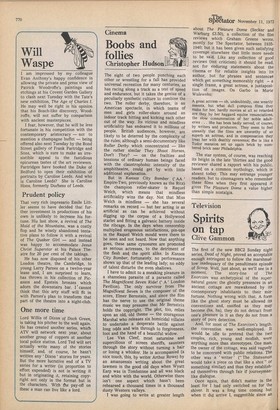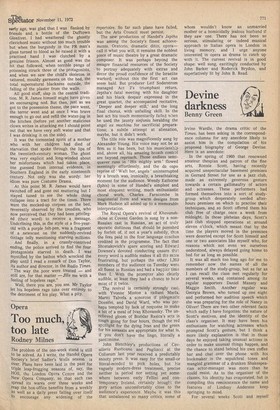Television
Spirits on tap
Clive Gammon
The first of the new BBC2 Sunday night series, Dead of Night, proved an acceptable enough astringent to follow the marshmallow inadequacy of the penultimate episode of Scoop. Well, just about, as we'll see in a moment. The story-line of The Exorcism was archetypical of the supernatural genre: the ghostly presences in an ancient cottage are reawakened by its contemporary inhabitants to their misfortune. Nothing wrong with that. A forth like the ghost story must be allowed its conventions and, ossified as they may become (ha, ha), they do not detract from one's pleasure in it as they do not from a story of pure detection.
And, for most of The Exorcism's length. the convention was well-employed. It would be idle to pretend that the two couples, rich, young and modish, were anything more than stereotypes. One man, the owner of the cottage, was said vaguely to be concerned with public relations. The other was a ' writer ' (" The Statesman would take a piece on that like a shot" or something similar) and thus they established themselves through fair if journeyman
like dialogue. Once again, that didn't matter in the least for I had only switched on for the shiver. It was a long time coming but when it did arrive I, suggestible since an early age, was glad that I was flanked by friends and a bottle of the Dufftown Glenlivet. I had weathered the ghostly clavichord music without too much trouble but when the burgundy in the PR man's glass turned to blood as he raised it with a practised hand I was clutched by a genuine frisson. Almost as good was the bit that followed, when terrible pangs of poisoning struck three of the protagonists, and when we saw the child's skeleton in tattered, mouldy garments on the bed, the total supernatural blackness outside, the falling of the plaster from the walls. All good stuff, slap in the central tradition. M. R. James himself might have given an encouraging nod. But then, just as we got to the possession theme, the pace went, the terror went and at once I was brave enough to go out and refill the water-jug in the kitchen (before yet another malicious clown writes in attacking me I should point out that we have very soft water and that I was drinking it on the side).
It was the tormented spirit of a mother who with her children had died of starvation that spoke through the lips of the twentieth-century woman. The ghost was very explicit and long-winded about her misfortunes which had taken place, one guessed from internal evidence, in Southern England in the early nineteenth century. Not only was she wordy: her Idiom was pure Costume Drama.
At this point M. R. James would have switched off and gone out muttering but I stayed tuned to see the whole thing collapse into a tract for the times. There were the mocked-up corpses on the bed, reverently observed by the trendies, who now perceived that they had been privileged (their word) to receive a message. Underlining this, in t'he style of a five-yearold with a purple felt-pen, was a fragment of a newscast on the suddenly-revived Cottage telly mentioning starving millions.
And finally, in a crassly-contrived ending, the police arrived to find the four protagonists starved to death. I was mystified by the bathos whch wrecked the play until I read a remark of Don Taylor, its author and director, in the Radio Times. "The way the poor were treated — and still are, for that matter —.fills me with a feeling of hopeless rage."
Well, there you are, you see. Mr Taylor let his hopeless rage take over entirely to the detriment of his play. What a pity.



















































 Previous page
Previous page